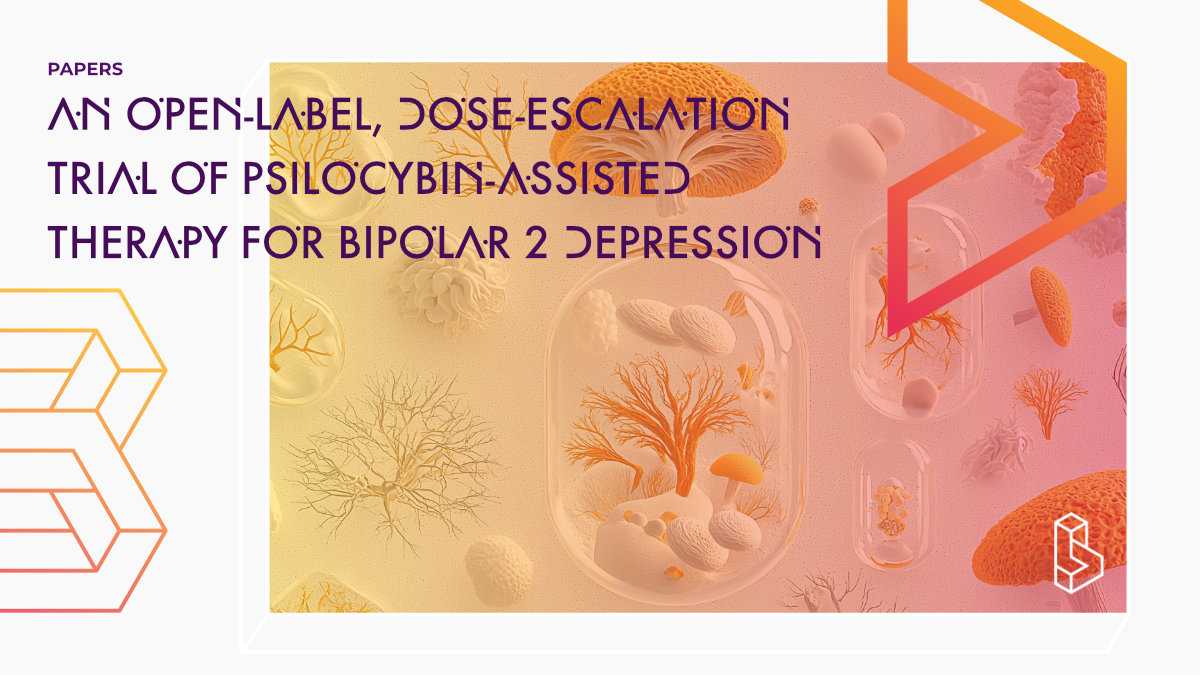This pre-print open-label trial (n=14) administered psilocybin (10-25mg) plus psychotherapy to people with bipolar II depression. It was well tolerated (only transient cardio spikes, mild anxiety/nausea/headache, and three temporary hypomania-or-suicidality events) and cut MADRS scores by 13–19 points at 21 days and 14 points at 90 days while boosting quality of life, with no excess mania or psychosis.
Abstract of An open-label, dose-escalation trial of psilocybin-assisted therapy for bipolar 2 depression
“Background: Individuals with bipolar II disorder (BD-II) and depression face limited treatment options and are often excluded from psilocybin therapy trials due to theoretical concerns of precipitating mania or psychosis. Although psilocybin has demonstrated antidepressant effects when combined with psychotherapy, adverse event reporting is inconsistent, and restrictive eligibility criteria limit generalizability.
Aims: To evaluate the safety, tolerability, and preliminary efficacy of psilocybin therapy in individuals with BD-II experiencing moderate-to-severe depression.
Method: In this open-label, single-arm pilot trial, 14 participants received 10 mg of psilocybin, followed by 25 mg if depressive symptoms persisted. Participants underwent psychotherapy before, during, and after psilocybin administration sessions and were proactively monitored for adverse events. Depression and quality of life were assessed using the Montgomery-Asberg Depression Rating Scale (MADRS) and Quality of Life in Bipolar Disorder Questionnaire (QoL BD), along with exploratory measures.
Results: Psilocybin was well tolerated, with transient increases in heart rate and blood pressure and no serious adverse events. Common adverse events included mild-to-moderate anxiety, nausea, and headache. Three participants experienced notable psychiatric adverse events (suicidal ideation and hypomania) which resolved with support. The frequency and nature of both serious and non-serious adverse events were broadly comparable to those reported in psilocybin studies for other conditions. MADRS scores improved at all timepoints: 21 days after 10 mg (-12.7 [2.7], p<0.001); 21 days after 25 mg (-18.6 [3.1], p<0.001) and 90 days after the final dose (-14.3 [2.8], p<0.001). Quality of life also improved at 90 days (31.2 [10.2], p=0.004). Conclusions: Psilocybin therapy under controlled conditions may be safe and effective in reducing depressive symptoms and improving quality of life in individuals with BD-II depression, and feared outcomes—mania, psychosis, and suicidality—do not appear elevated relative to other clinical populations treated with psilocybin. Given the high psychiatric comorbidity and general vulnerability to adverse events in this population, randomized, placebo-controlled trials are needed to confirm efficacy and refine dosing protocols in larger samples.”
Authors: Amanda E. Downey, Balázs Szigeti, Ellen R. Bradley, Gisele Fernandes-Osterhold, Kimberly Sakai, Katiah Llerena, Jerusalem Nerayo, Lisa Fredenburg, Brittany Nielsen, Andrew D. Krystal, Aoife O’Donovan, David E. Gard & Josh D. Woolley
Summary of An open-label, dose-escalation trial of psilocybin-assisted therapy for bipolar 2 depression
Bipolar II disorder (BD-II) affects roughly 0.4% of the world’s population and is characterised by recurrent, often prolonged depressive episodes interspersed with periods of hypomania. Conventional pharmacological and psychotherapeutic treatments frequently leave residual symptoms, and many people cycle through multiple medications without durable benefit. The authors note that psilocybin has produced rapid, sizeable antidepressant effects in previous trials when paired with structured psychotherapy, yet individuals with BD (or even a family history of BD) have been routinely excluded because of fears of precipitating mania or psychosis. Early pilot work hinted at safety and efficacy in BD-II, but small samples, inconsistent dosing, and sparse adverse-event reporting limited confidence. The present study, therefore, set out to obtain systematic safety data and preliminary signals of efficacy in a real-world BD-II cohort.
Challenges in translating psilocybin therapy
Modern psilocybin trials have shown promise, yet two obstacles stand out. First, adverse events are inconsistently captured: many studies log only drug-related physiological effects and ignore psychotherapy-related or delayed psychiatric reactions. Second, restrictive entry criteria—especially the exclusion of comorbid psychiatric conditions—hamper generalisability. To address both issues, the authors designed an open-label, dose-escalation pilot that included participants with common BD-II comorbidities and implemented proactive, comprehensive adverse-event monitoring across the entire treatment trajectory.
Methods
Participants
Find this paper
An open-label, dose-escalation trial of psilocybin-assisted therapy for bipolar 2 depression
https://doi.org/10.31234/osf.io/97cqx_v1
Open Access | Google Scholar | Backup | 🕊
Study details
Compounds studied
Psilocybin
Topics studied
Bipolar Disorder
Depression
Study characteristics
Original
Open-Label
Participants
14
Humans
Compound Details
The psychedelics given at which dose and how many times
Psilocybin 10 - 25mg | 2x
Linked Clinical Trial
Psilocybin Therapy for Depression in Bipolar II Disorder (BAP)The purpose of this study is to determine the safety, tolerability, and feasibility of psilocybin therapy in people with Bipolar II Disorder.

